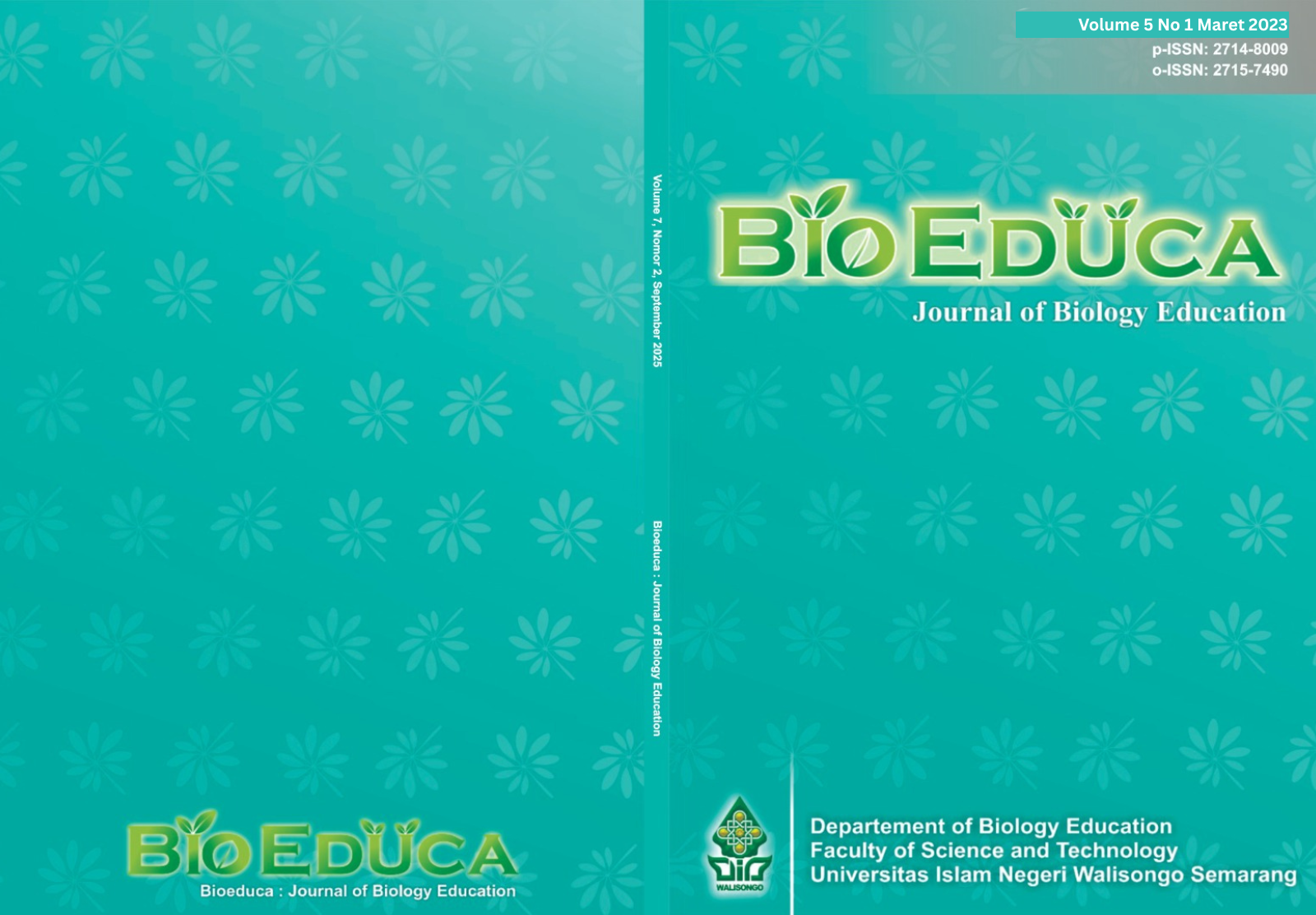The Correlation between Self Efficacy with Problem Solving Ability of Student in Studying Ecosystem
Main Article Content
Abstract
Students need the ability to explore, think critically and analyze a problem for a logical and appropriate solution. Problem solving abilities accompanied with a belief in their abilities (self efficacy) will maximize student abilities in and get maximum grades. This research aims to analyze the correlation between self efficacy and students' problem-solving abilities in ecosystem material. The method used is a quantitative method with a correlational approach (relationship study). The data collection technique was in the form of a problem-solving ability test in the form of an essay about ecosystem and a self efficacy questionnaire. The data analysis technique uses the Product Moment correlation test. Based on the results of data analysis and hypothesis testing, a correlation coefficient value of 0.675 was obtained, which means that the correlation coefficient level is strong. It can be concluded that there is a correlation between self efficacy and problem-solving abilities of students in ecosystem material with a strong correlation coefficient.
Downloads
Article Details
The copyright of the received article shall be assigned to the journal as the publisher of the journal. The intended copyright includes the right to publish the article in various forms (including reprints). The journal maintains the publishing rights to the published articles. Authors are allowed to use their articles for any legal purposes deemed necessary without written permission from the journal with an acknowledgment of initial publication to this journal.

This work is licensed under a Creative Commons Attribution-ShareAlike 4.0 International License.
References
Amanda, F. F., Sumitro, S. B., Lestari, S. R., & Ibrohim, I. (2021). Analysis of the Relationship Between Concept Mastery and Problem-Solving Skills of Pre-Service Biology Teachers in Human Physiology Courses. Jurnal Pendidikan Sains Indonesia, 9(3), 421–432. https://doi.org/10.24815/jpsi.v9i3.19956
Azhari, dini nabila. (2021). Korelasi Self Confidence Dengan Kemampuan Pemecahan Masalah Peserta Didik Pada Materi Keanekaragaman Hayati. Biosfer : Jurnal Biologi Dan Pendidikan Biologi, 5(2), 26–31. Retrieved from https://journal.unpas.ac.id/index.php/biosfer/article/view/3403
Fajarianingtyas, D. A., & Hidayat, J. N. (2022). Pengembangan Lembar Kerja Mahasiswa PBL Berorientasi Kemampuan Pemecahan Masalah Perkuliahan Biologi Dasar. Bioeduca: Journal of Biology Education, 4, 43–50.
Fauziana. (2022). Pengaruh Self Efficacy Terhadap Kemampuan Memecahkan Masalah IPA. PIONIR: Jurnal Pendidikan, 11(1), 17–22. Retrieved from https://jurnal.unma.ac.id/index.php/dm/article/view/1963/1659
Fraenkel, J. R., Wallen, N. E., & Hyun, H. E. (2012). How to Design and Evaluate Research in Education. New York: Mc Graw- Hill, Inc.
Indriyanti, I. N., Rahayuningtyas, M., & Marianti, A. (2019). Analisis Kemampuan Pemecahan Masalah Pada Pembelajaran Biologi Melalui Program Gerakan Literasi Sekolah Kelas Xi Mip. Bioma : Jurnal Ilmiah Biologi, 8(1), 278–290. https://doi.org/10.26877/bioma.v8i1.4684
Malinen, O. P., Savolainen, H., Engelbrecht, P., Xu, J., Nel, M., Nel, N., & Tlale, D. (2013). Exploring teacher self-efficacy for inclusive practices in three diverse countries. Teaching and Teacher Education, 33, 34–44. https://doi.org/10.1016/j.tate.2013.02.004
Merlis, N. (2017). Hubungan Antara Self-Efficacy Dengan Kecemasan Siswa Dalam Menghadapi Praktikum Ipa (Sarjana Th). Universitas Negeri Jakarta.
Rahayu, F. (2019). Efektivitas Self Efficacy Dalam Mengoptimalkan Kecerdasandan Prestasi Belajar Peserta Didik. 2(2), 119–129.
Shofiana, F., & Melisa, A. O. (2022). Efektivitas Guided Inquiry Berbasis Lingkungan terhadap Kemampuan Berpikir Kritis dan Self Efficacy. Bioeduca: Journal of Biology Education, 4, 61–69.
Sigit, D. V., Heryanti, E., Pangestika, D. A. W., & Ichsan, I. Z. (2019). Pembelajaran Lingkungan bagi Siswa: Hubungan Kemampuan Berpikir Kreatif dengan Kemampuan Pemecahan Masalah. Jurnal Pendidikan: Teori, Penelitian, Dan Pengembangan, 4(1), 6. https://doi.org/10.17977/jptpp.v4i1.11838
Silvia, A., & Miterianifa. (2019). Desain Lembar Kerja Peserta Didik Berbasis Problem Based Learning Untuk Meningkatkan Self-Efficacy Peserta Didik. 1(Juni), 78–90.
Sugiyono. (2013). Metode Penelitian Kuantitatif Kualitatif dan R&D (13th ed.). Bandung: Alfabeta, CV.
Tawil, M., & Liliasari. (2013). Berpikir Kompleks dan Implementasinya dalam Pembelajaran. Makassar: Badan Penerbit Universitas Negeri Makassar.
Topano, A., & Walid, A. (2021). Pengaruh Problem Based Learning ( PBL ) Terhadap Kemampuan Pemecahan Masalah dan Hasil Belajar Kognitif Siswa SMA Negeri 10 Kota Bengkulu. 3(3), 717–727.
Usha Adiga and Sachidananda Adiga. (2015). Problem Based Learning. 7(6).
Utami, R. W., & Wutsqa, D. U. (2017). Analisis kemampuan pemecahan masalah matematika dan self-efficacy siswa SMP negeri di Kabupaten Ciamis. Jurnal Riset Pendidikan Matematika, 4(2), 166. https://doi.org/10.21831/jrpm.v4i2.14897
Yolanda, F. (2019). Penerapan Pembelajaran Kooperatif Tipe Numbered Head Together (NHT) Untuk Meningkatkan Self-Efficacy Siswa. 3.
Zahra, P., Gresinta, E., & Pratiwi, R. H. (2021). Pengaruh Kecerdasan Intrapersonal Terhadap Kemampuan Pemecahan Masalah pada Mata Pelajaran Biologi. EduBiologia: Biological Science and Education Journal, 1(1), 48. https://doi.org/10.30998/edubiologia.v1i1.8087

